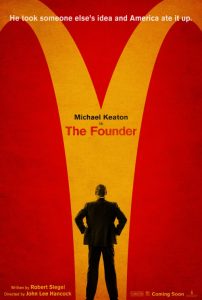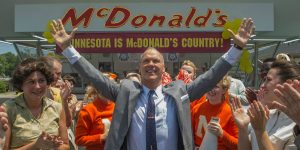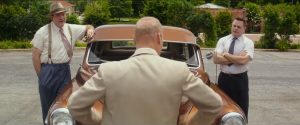
I can hear the cheeky criticism now: John Lee Hancock’s direction of “The Founder” is as vanilla as the McDonald’s milkshakes! While I won’t disagree with this statement, I do question its negative stance. While the vanilla nature may have resulted in mawkish drama in “The Blind Side,” it perfectly complements the warped reality of one Ray Croc (Michael Keaton). It is his story, after all, him being the titular “founder” of McDonald’s. For he sees the world as a cheery commercial promoting the American Dream, paying no attention to the hurdles and limitations of everyday life. Those who don’t want to do business and/or strike it rich are content with the banal comfort of life. He wants more and will cut the legs out from underneath anyone standing in his way. In his mind, he is the hero, even when the rest of the world paints him as a villain.
For Ray to fumble around the Midwest unsuccessfully hocking a multi-purpose milkshake maker to drive-ins, it has to be presented as a cartoonish montage to fit his ideal. It needs to be seen as a struggle, but a minor one that is glossed over rather quickly. It needs to be comedic to play alongside his effortless charm lest he comes across as a bumbling fool. It is okay for him to look as such when money is to be had, such as when he first discovers the McDonald’s in San Bernardino, California, for that represents the spark in his mind going off.

And what an introduction McDonald’s gets! As Ray pulls into the roundabout housing the restaurant, he approaches the cozy structure as if it were a church. The building of affordable burgers and fast service is his savior: the golden arches representing his salvation. He even bluntly compares it to church, stating the franchise will be a wholesome family tradition the same way religion is viewed as. Even the name promotes virtuosity. He must have it at any cost. Through slick salesman tactics and finagling, he’s able to convince the owners, brothers Dick & Mac (Nick Offerman & John Carroll Lynch), to allow him to franchise their business.
It’s not long until a McDonald’s is popping up on every corner in the Midwest. Once the laughing stock of the business world, Ray Croc has now turned his image around: he’s the smart and brash opportunist with an idea as golden as the arches. His fortunes, however, don’t turn the tide, as his expansion techniques are thwarted by his contract with the McDonald brothers. They oppose unscrupulous shortcuts for higher profit margins, tying down Ray’s aspirations. It’s not until a financial consultant, Harry J. Sonneborn (B.J. Novak), convinces him to bypass the contract by investing in the real estate, not the restaurant itself, that Croc hits it big. So big he’s able to undermine his contract and buy the company out from under the brothers.

Where the vanilla direction does pose a problem is in the human drama. It does wonders for the business portion of the biography, perfectly highlighting the flashy tactics that are accompanied by Carter Burwell’s peppy score. It doesn’t complement the rawness of reality, resulting in the human interest pieces to fall a little flat. I do find this to be intentional, to show off how bleak the real world is for Ray when he’s not expanding and raking in more money. It falters not because of that, but because the juxtaposition between the two don’t mesh. When the story is focused on human emotion, it loses interest, unfortunately, due to the hollowness of it.
Only two fleeting moments ring through as authentic. One involves a mundane dinner at a country club, where Ray pitches his McDonald’s idea and turns his persona around. That happens so quickly that the humanity doesn’t last. The same goes for the second moment, wherein he asks his wife, Ethel (Laura Dern), for a divorce. Her reaction is of stunned shock and seeming expectance, captured perfectly by Dern’s humble performance. She had the unenviable task of portraying the thankless role of the neglected wife and brought warmth and compassion to the proceedings. Both of these moments may not get a lot of time to breathe, but that’s in line with Ray’s bombastic energy. Unlike the other scenarios, such as his affair with Joan Smith (Linda Cardellini), wife of entrepreneur Rollie Smith (Patrick Wilson), these gel well with the tone.

The second half may not be as captivating as the first, but it’s engaging nonetheless. The story of how McDonald’s came to be the pioneer of the fast food industry is filled with enough betrayals and circumstances to easily stock Robert Siegel’s script. He and Hancock may coast on these happenings too often, neglecting to bolster the humanity, but they’re able to sustain interest for the duration of the movie. Snagging Michael Keaton to portray Ray Croc was a brilliant maneuver, as his magnetic attitude fits the slimy salesman to a tee. One can buy the brothers and others buying into his scheme simply because of how enchanting his personality is. His amusing antics are enough to distract from his crooked business practices, with Hancock’s vanilla direction supplementing that wonderfully! It may not come together as a whole, but it never loses its luster.
Final Rating: B
